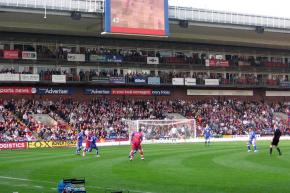What makes a proper team?
Most British football fans defy the media obsession with the top-level Premier League and support lower-league teams, glorying in their less predictable fortunes.
WHAT A thrilling season it was in the Premier League, agree all the experts. But surely instead of thrilling, they actually mean pointlessly predictably relentlessly tedious. Almost every club has finished within one or two places of its designated position, in accordance with how rich it is. So the time must have come to reform the rules.
From now on, at the start of August, all the club chairmen should declare how much money they've got, and the league table should be based on the results. This will save the bother of having to play the games.
The Premier League has about six sub-divisions, from which hardly anyone escapes. It could only have been won by one of three teams. Liverpool was certain to be fourth as always, so a disastrous season means coming fourth, but only just. Then comes a batch including Everton, Aston Villa and Tottenham, who compete for fifth to tenth and so on, until the three poorest are relegated.
Soon, a season will end with commentators shrieking: "What an extraordinary year it's turned out to be--who could ever have predicted West Ham would end up eleventh instead of ninth. It just goes to show what an amazingly unpredictable game this is."
They might as well get the teams to rehearse the matches beforehand. Instead of managers, they could have film directors, calling through a megaphone: "OK cut, cut, cut, look Rio, love, we've been through this, you miss the first tackle on Michael Owen, then track back to recover, and I want to see you glide, love, like an angel. Now let's take it from the top."
Then, to make it slightly less predictable, they could get scriptwriters, like in American wrestling. So Nicky Butt will come off the subs bench dressed as Dracula and use a Vulcan neck grip to send Emile Heskey to sleep, which the ref somehow doesn't spot. Or Frank Lampard will grab a microphone as he's about to take a penalty and propose to Fernando Torres, and the two of them will be married by the linesman.
One result of a football club's position being so defined by its wealth is that casual supporters almost all support one of the top three teams. Although they have no connection with the area or affinity with the club, they can buy the shirt and stand in pubs yelling "Go on, my son!"

But they might as well go round asking people which planet they support, and whatever the answer, they can reply: "Well, I support Jupiter--and we've won the biggest planet championship four billion years in a row. Can you hear the Venus sing--no-oh, no-oh."
THE ONLY way a Premier League club can change position is if it's bought by a devious billionaire, so this brings out the worst in people, such as the Manchester City fans, who screamed with delight when their club became the property of a hugely rich and shady ex-prime minister of Thailand.
They'd be just as ecstatic if their club was bought by the Burmese military government, as long as it promised to invest 300 million quid on players. Fans would hail the new board and yell, "Fantastic news--the chairman has stolen every penny of the cyclone fund and spent it on a solid central defender."
What the media obsession with the Premier League misses is that most football fans defy this logic and support lower-league teams, glorying in their team's wheezing progress or decline, still just about able to identify with the club and its players.
For example, at Crystal Palace, the fans have been almost delirious in recent months, not just because of reaching the playoffs, but because the manager, Neil Warnock, has put several of the youth players in the side, and it feels like we're cheering on lads from round the corner.
When a club feels part of the community, which in some sense is the case for most teams, the fans can enjoy the irrational misery that comes with failure as a price to be paid for the irrational jubilation that accompanies odd moments of success. And then it's fun; ridiculous, heart-stopping, tearful, manic fun, and with none of the arrogance that comes with supporting a team that can't come lower than third.
There was such a moment in Palace's last league match of the season, which we had to win to ensure a place in the playoffs. Incredibly, Palace was winning 5-0, so 10 minutes from the end, there was an announcement that playoff tickets would be on sale immediately after the game. And all around me, I heard people saying, "Hang on, don't tempt fate, we haven't won yet."
That's the fretful, humble, unpredictable joy of supporting a proper team. And that, your honor, is why, after the May 13 playoff against Bristol City, according to the result, I was a) drunkenly setting off fireworks from the roof of the library, or b) morosely sat in the park throwing rocks at a duck.
First published in the Independent.


